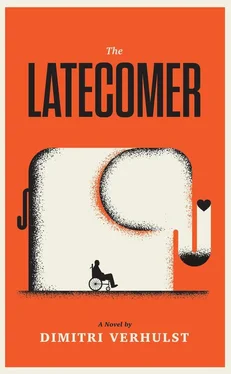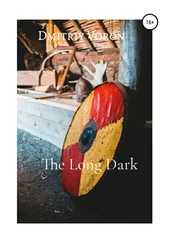Yes, what could we do about it?
Nowadays we always think of ourselves as too young for the worms or the chimney. Rounding the cape of eighty should be a piece of cake in those regions where the majority of the population has access to modern medicine. Even cats make it into their twenties with relative ease these days, thanks to the massive improvement in the quality of tinned cat food. And as a cat, you’d have to be very old-fashioned indeed to still fancy a fat little free-range mouse, twitching its tail just in front of your jaws. But we old-age pensioners still smash the television set, howling with rage when it shows a twenty-something, jauntily lit by the halo of his own dreams, a wag in a suit, with the self-confidence of someone who’s just bought his second car, claiming that he has lost all faith in the social-security system, that he’s not participating in the strikes against the right-wing reforms because he has no desire to contribute to the pensions of all those who clocked off forever at the age of sixty-five. And you feel him biting his tongue almost in half to avoid undiplomatically adding, ‘If those bald-headed bastards are still fit enough to practise their various hobbies, they can just as well get a job.’
From the start of each requiem we, the pensioners, know in our hearts that the body in the coffin being slid from the shining limo is old. Irrevocably old and worn out. As old and worn out as we ourselves. But because a mad roll of the dice has kept us this side of dying, and half embarrassed with regard to the deceased, we say that he or she has been robbed of a few beautiful years. Justice is a human concept, in nature it is nowhere to be seen. Unless the lamented has been laid low by a filthy, painful disease; then we reduce our late friend to the poor wretch they were during the last phase of their life and express our gratitude to death, their saviour.
We bow to the person who is laid out, splash a few drops of holy water over the coffin lid perhaps, offer our condolences to relatives who don’t have a clue who we are and wonder what on earth our significance in the life of the demised might have been. We then seek out our regular, much-too-hard pew, on which we, fighting drowsiness, undergo the litany. How grateful we are when incense obscures the bier and we are finally free to cough ourselves out of our boredom; glad to be able to stretch our stiff legs by fetching a host from the altar or a holy card with an accompanying portrait and saccharine verse. We listen to the obligatory funeral hits, which, though subject to the whims of fashion, seem keen to assert in extremis that the deceased had been afflicted by extremely poor taste. After that, all the hymns are sung and the bodily remains disappear through the big gate, hoopla into the big dark hole of eternal forgetting, amen.
Winterlight funerals aren’t as bound by ritual. At least not for those whose funeral service takes place under this roof, those who have been left over, discarded and erased from other people’s memories even before they became the filling for a burial plot. The priest rattles through his prayers in a tearing hurry before an audience that sometimes consists of just one token nun drummed up for the occasion. No funeral march, no tolling of bells, no elegies for a life whose details all have forgotten, the only traces of which are to be found in the odd medical dossier. A hearse drives up to the rear of the building — the goods entrance, where they also keep the rubbish containers — loads up the dead body and quietly drives off again. A room has become available, the cogs keep turning.
No, give me a chat in the town square with the other hangers-on after the funeral service, dredging up semi-consoling memories. During what was ostensibly the last funeral I attended with my mental faculties fully intact, we were standing under the plane trees when a member of our regular clique let slip, ‘Next time we’re standing here together in our black raincoats, it could very well be for Rosa Rozendaal!’ I wonder still if it was clear from my face how distraught that made me.
Rosa. Rosa rugosa. Rosa nitida. Rosa villosa. Rosa Rozendaal.
It had been more than fifty years since I had heard someone mention Rosa Rozendaal. To be honest, I had given up hope of ever hearing her name cross anyone’s lips again. I thought she had taken off long ago to live somewhere else, where life was that little bit more gripping, and with a man, of course. I presumed she had borne children who had all been university material, and she herself, after a fulfilling career, had thrown herself into grandmothering a following generation.
Rosa Rozendaal … I was sixteen and she was the first girl I ever danced with, at one of the very first parties my parents let me go to. The Albatross Party Centre, the Saturday of the town fair. Earlier in the evening, local hero Victor Wartel had won the annual bike race and his victory was doing wonders for the turnover at the bar. And a little later accordion trio The 3 Jacksons, world stars in territories just under and just over sea level, played some racy adaptations of Fats Domino songs, ‘Muskrat Ramble’ … and other things that drove that year’s crop of spotty adolescents wild.
Suspecting me of being any kind of lady-killer would be a mistake; it was Rosa who flouted the custom of the day by asking me to dance. And that made me the luckiest person in the entire northern hemisphere, if not far beyond. Rosa: I had hardly dared to look in her direction, but now I was out on the dance floor with her. Not even the gods could understand what I’d done to deserve it. Not the gods, and certainly not me. I felt an urge to apologise to the crowd of boys glowering at me through the smoke of their Belga cigarettes. Do I need to spell out that I hadn’t missed my calling as a dancer? I could keep time, sure, but that was all. Still, I was apparently good enough for her to dance with me for one more song. Something wild and devilish, rock ’n’ roll, a new wind that was warmly welcomed by dancers of my inept ilk as its rhythms made it possible to compensate for a lack of technique with commitment alone. She was feeling a bit hot, she said. She wanted to step outside for a breath of fresh air and asked if I’d go with her. Up to this point, she’d done all the preparatory work. An enterprising character. But now it was up to me. There was no point in being coy about it, I knew what I had to do. No girl alive asked a boy to step outside with her for no reason. And definitely not when they’d just been dancing together. But when we got outside I didn’t do anything. I just stood there for a while next to her. Just standing there. Thinking up the most pathetic questions a boy could come up with on such a glorious occasion. Where she went to school, if she liked going to school, what kind of job she was thinking of doing later, and, for Christ’s sake, if she had any idea if she wanted to have kids and, if so, how many … It was effectively my first party and I wanted to show her that I was a gentleman, that I had more than one thing on my mind. Of all the great secrets that are peculiar to the female of our often disgusting species, I was convinced I knew one: namely that women have a horror of men who make their move too quickly and too directly.
Meanwhile Rosa had cooled off ( you should have warmed her up, you idiot ) and suggested going back inside, those three Jacksons were still playing. I realised immediately that I had put my heart and soul into squandering a chance that had been presented to me on a golden platter. As for Rosa, what must she have thought? That I was a member of the limp-wrist brigade? That I didn’t think she was pretty enough? That I was on the verge of choosing to further my studies at the seminary — I was already studying Latin after all? No idea, but the bird had flown, never to return. In the months that followed I saw Rosa several times in the company of a youth who could grow a proper moustache and the sight always pained me to the roots of my teeth. But after that she simply vanished. Never to be seen again. If someone had told me she’d moved abroad, I would have believed it instantly.
Читать дальше












